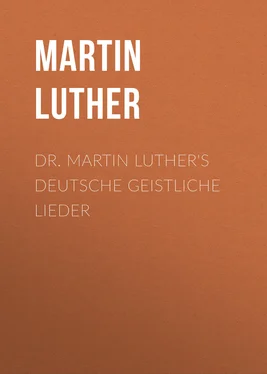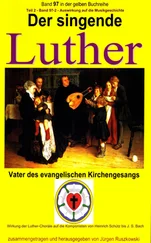Martin Luther - Dr. Martin Luther's Deutsche Geistliche Lieder
Здесь есть возможность читать онлайн «Martin Luther - Dr. Martin Luther's Deutsche Geistliche Lieder» — ознакомительный отрывок электронной книги совершенно бесплатно, а после прочтения отрывка купить полную версию. В некоторых случаях можно слушать аудио, скачать через торрент в формате fb2 и присутствует краткое содержание. Издательство: Иностранный паблик, Жанр: foreign_prose, foreign_religion, Философия, foreign_psychology, foreign_antique, на немецком языке. Описание произведения, (предисловие) а так же отзывы посетителей доступны на портале библиотеки ЛибКат.
- Название:Dr. Martin Luther's Deutsche Geistliche Lieder
- Автор:
- Издательство:Иностранный паблик
- Жанр:
- Год:неизвестен
- ISBN:нет данных
- Рейтинг книги:4 / 5. Голосов: 1
-
Избранное:Добавить в избранное
- Отзывы:
-
Ваша оценка:
- 80
- 1
- 2
- 3
- 4
- 5
Dr. Martin Luther's Deutsche Geistliche Lieder: краткое содержание, описание и аннотация
Предлагаем к чтению аннотацию, описание, краткое содержание или предисловие (зависит от того, что написал сам автор книги «Dr. Martin Luther's Deutsche Geistliche Lieder»). Если вы не нашли необходимую информацию о книге — напишите в комментариях, мы постараемся отыскать её.
Dr. Martin Luther's Deutsche Geistliche Lieder — читать онлайн ознакомительный отрывок
Ниже представлен текст книги, разбитый по страницам. Система сохранения места последней прочитанной страницы, позволяет с удобством читать онлайн бесплатно книгу «Dr. Martin Luther's Deutsche Geistliche Lieder», без необходимости каждый раз заново искать на чём Вы остановились. Поставьте закладку, и сможете в любой момент перейти на страницу, на которой закончили чтение.
Интервал:
Закладка:
It seems superfluous to add to this testimony the word of Sleidan, the nearly contemporary historian, who says expressly concerning " Ein' feste Burg " that Luther made for it a tune singularly suited to the words, and adapted to stir the heart. 6 6 Quoted in Rambach, p. 215.
If ever there were hymn and tune that told their own story of a common and simultaneous origin, without need of confirmation by external evidence, it is these.
To an extent quite without parallel in the history of music, the power of Luther's tunes, as well as of his words, is manifest after three centuries, over the masters of the art, as well as over the common people. Peculiarly is thistrue of the great song Ein' feste Burg , which Heine not vainly predicted would again be heard in Europe in like manner as of old. The composers of the sixteenth and seventeenth centuries practised their elaborate artifices upon it. The supreme genius of Sebastian Bach made it the subject of study. 7 7 In more than one of his cantatas, especially that for the Reformationsfest.
And in our own times it has been used with conspicuous effect in Mendelssohn's Reformation Symphony, in an overture by Raff, in the noble_Festouverture_ of Nicolai, and in Wagner's Kaisermarsch; and is introduced with recurring emphasis in Meyerbeer's masterpiece of The Huguenots.
It is needless to say that the materials of this Birth- day Edition of Luther's Hymns and Tunes have been prepared in profusion by the diligence of German scholars. But very thankful acknowledgments are also due to English translators, who have made this work possible within the very scanty time allotted to it. Full credit is given in the table of contents for the help derived from these various translators. But the exigencies of this volume were peculiarly severe, inasmuch as the translation was to be printed over against the original, and also under the music. Not even Mr. Richard Massie's careful work would always bear this double test; so that I have found myself compelled, in most cases, to give up the attempt to follow any translation exactly; and in some instances have reluctantly attempted a wholly new version. The whole credit of the musical editorship belongs to my accomplished associate, Mr. Nathan H. Allen, without whose ready resource and earnest labor the work would have been impossible within the limits of time necessarily prescribed. In the choice of harmonies for these ancient tunes, he has wisely preferred, in general, the arrangements of the older masters. The critical musician will see, and will not complain, that the original modal structure of the melodies is sometimes affected by the harmonic treatment.
And now the proper conclusion to this Introduction, which, like the rest of the volume, is in so slight a degree the work of the editor, is to add the successive prefaces from the pen of Luther which accompanied successive hymn-books published during his life-time and under his supervision.
LEONARD WOOLSEY BACONLuther's First Preface
To the "Geystliche Gsangbuechlin, Erstlich zu Wittenberg, und volgend durch Peter schoeffern getruckt, im jar m. d. xxv. Autore Ioanne Walthero."
That it is good, and pleasing to God, for us to sing spiritual songs is, I think, a truth whereof no Christian can be ignorant; since not only the example of the prophets and kings of the Old Testament (who praised God with singing and music, poesy and all kind of stringed instruments) but also the like practice of all Christendom from the beginning, especially in respect to psalms, is well known to every one: yea, St. Paul doth also appoint the same (I Cor. xiv.) and command the Colossians, in the third chapter, to sing spiritual songs and psalms from the heart unto the Lord, that thereby the word of God and Christian doctrine be in every way furthered and practiced.
Accordingly, to make a good beginning and to encourage others who can do it better, I have myself, with some others, put together a few hymns, in order to bring into full play the blessed Gospel, which by God's grace hath again risen: that we may boast, as Moses doth in his song (Exodus xv.) that Christ is become our praise and our song, and that, whether we sing or speak, we may not know anything save Christ our Saviour, as St. Paul saith (I Cor. ii).
These songs have been set in four parts, for no other reason than because I wished to provide our young people (who both will and ought to be instructed in music and other sciences) with something whereby they might rid themselves of amorous and carnal songs, and in their stead learn something wholesome, and so apply themselves to what is good with pleasure, as becometh the young.
Beside this, I am not of opinion that all sciences should be beaten down and made to cease by the Gospel, as some fanatics pretend; but I would fain see all the arts, and music in particular, used in the service of Him who hath given and created them.
Therefore I entreat every pious Christian to give a favorable reception to these hymns, and to help forward my undertaking, according as God hath given him more or less ability. The world is, alas, not so mindful and diligent to train and teach our poor youth, but that we ought to be forward in promoting the same. God grant us his grace. Amen.
Luther's Second Preface
To the Funeral Hymns: "Christliche Geseng, Lateinisch und Deudsch, zum Begrebnis. Wittemberg, Anno m. d. xlii."
DR. MARTIN LUTHER TO THE CHRISTIAN READER. St. Paul writes to the Thessalonians, that they should not sorrow for the dead as others who have no hope, but should comfort one another with God's word, as they who have a sure hope of life and of the resurrection of the dead. For that they should sorrow who have no hope is not to be wondered at, nor indeed are they to be blamed for it, since, being shut out from the faith of Christ, they must either regard and love the present life only, and be loth to lose it, or after this life look for everlasting death and the wrath of God in hell, and be unwilling to go thither.
But we Christians who from all this have been redeemed by the precious blood of the Son of God, should exercise and wont ourselves in faith to despise death, to look on it as a deep, sound, sweet sleep, the coffin no other than the bosom of our Lord Christ, or paradise, the grave nought but a soft couch of rest; as indeed it is in the sight of God, as he saith in St. John, xi., "our friend Lazarus sleepeth;" Matthew ix., "the maid is not dead but sleepeth."
In like manner also St. Paul, I Cor. xv., doth put out of sight the unlovely aspect of death in our perishing body, and bring forward nought but the lovely and delightsome view of life, when he saith: "It is sown in corruption; it is raised in incorruption; it is sown in dishonor (that is, in a loathsome and vile form); it is raised in glory: it is sown in weakness; it is raised in power: it is sown a natural body; it is raised a spiritual body."
Accordingly have we, in our churches, abolished, done away, and out-and-out made an end of the popish horrors, such as wakes, masses for the soul, obsequies, purgatory, and all other mummeries for the dead, and will no longer have our churches turned into wailing-places and houses of mourning, but, as the primitive Fathers called them, "Cemeteries," that is, resting and sleeping places.
We sing, withal, beside our dead and over their graves, no dirges nor lamentations, but comforting songs of the forgiveness of sins, of rest, sleep, live and resurrection of the departed believers, for the strengthening of our faith, and the stirring up of the people to a true devotion.
For it is meet and right to give care and honor to the burial of the dead, in a manner worthy of that blessed article of our creed, the resurrection of the dead, and to the spite of that dreadful enemy, death, who doth so shamefully and continually prey upon us, in every horrid way and shape. Accordingly, as we read, the holy patriarchs, Abraham, Isaac, Jacob, Joseph, and the rest, kept their burials with great pomp, and ordered them with much diligence; and afterwards the kings of Judah held splendid ceremonials over the dead, with costly incense of all manner of precious herbs, thereby to hide the offense and shame of death, and acknowledge and glorify the resurrection of the dead, and so to comfort the weak in faith and the sorrowful. In like manner, even down to this present, have Christians ever been wont to do honorably by the bodies and the graves of the dead, decorating them, singing beside them and adorning them with monuments. Of all importance is that doctrine of the resurrection, that we be firmly grounded therein; for it is our lasting, blessed, eternal comfort and joy, against death, hell, the devil and all sorrow of heart. As a good example of what should be used for this end, we have taken the sweet music or melodies which under popish rule are in use at wakes, funerals and masses for the dead, some of which we have printed in this little book; and it is in our thought, as time shall serve, to add others to them, or have this done by more competent hands. But we have set other words thereto, such as shall adorn our doctrine of the resurrection, not that of purgatory with its pains and expiations, whereby the dead may neither sleep nor rest. The notes and melodies are of great price; it were pity to let them perish; but the words to them were unchristian and uncouth, so let these perish.
Читать дальшеИнтервал:
Закладка:
Похожие книги на «Dr. Martin Luther's Deutsche Geistliche Lieder»
Представляем Вашему вниманию похожие книги на «Dr. Martin Luther's Deutsche Geistliche Lieder» списком для выбора. Мы отобрали схожую по названию и смыслу литературу в надежде предоставить читателям больше вариантов отыскать новые, интересные, ещё непрочитанные произведения.
Обсуждение, отзывы о книге «Dr. Martin Luther's Deutsche Geistliche Lieder» и просто собственные мнения читателей. Оставьте ваши комментарии, напишите, что Вы думаете о произведении, его смысле или главных героях. Укажите что конкретно понравилось, а что нет, и почему Вы так считаете.












